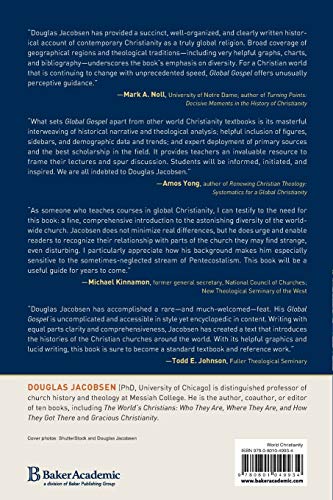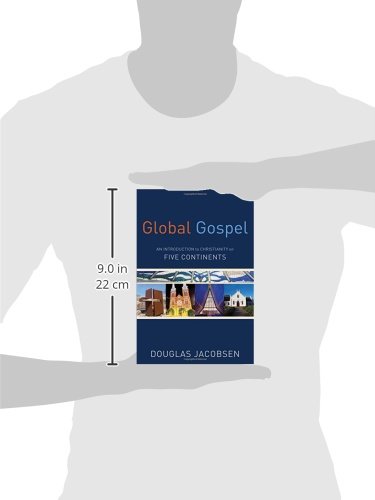



Global Gospel: An Introduction to Christianity on Five Continents
M**N
Overview of Christianity in four traditions on five continents
Helpful summation of the history of Christianity both through the lens of several traditions (Catholicism, Orthodoxy, Protestantism, and, in a surprising distinction, Pentecostalism), then through its development on each of five cultural basins/continents.Also, though this is not a strong focus, Jacobsen identifies a key idea in each region's history and practice that shapes their faith and suggests a cultural contribution to the rest of the global Church:- AFRICA: For Africa, he explored the concept and outworking of "ubuntu." the interconnectedness of all people which fuels a focus on reconciliation, awareness of one's ancestors, and a belief that God is the God of all ("to refer to God as my God or our God is nonsense because God cannot be owned.").- LATIN AMERICA: "If one word captures the core message of the gospel in Latin America today it is 'liberation,'" the author asserts, exploring this emphasis through the lenses of socioeconomics, race, and spiritual deliverance.- EUROPE: "Compared to Christians elsewhere, Christians in Europe have always placed great emphasis on 'truth,' the correspondence between Christian claims and reality itself," he says, exploring European Christianity's emphasis on science and reason, suggesting that this is a helpful legacy but has its limits and has been challenged.- ASIA: Although summing up Christianity in Asia is a challenge, Jacobsen identifies the Asian emphasis on "harmony" as a significant contribution, unpacking its effects on civic loyalty, engaging respectfully with those of other faiths, and acknowledging and repairing broken relationships and disharmony.- NORTH AMERICA: The key theological concept the author links with the American experience will come as no surprise. Jacobsen explores how Christian faith in North America is powerfully shaped by convictions about "freedom," particularly the conviction that faith must be freely chosen rather than a matter of culture or compulsion.Pictures, charts, maps, and excerpts from the writings of key figures round out the picture. Footnotes and sources suggest direction for further study. It took some discipline to get through the whole book, but I think it will prove a good reference for years to come.
G**Y
MUST READ for All Christians!
With the global dynamics today, fusions and confusions of faiths and religions, and effects and side effects of Christianity's role in the world's development of unification, it's important to understand the different faces and hearts of Christianity in different ethnic groups. Although everyone is human, each human prefers to be loved in his/her unique way. This unique way is still an overflow of the Way, but with human limitations we must understand each uniqueness while building our understanding of the Way's completeness.
A**S
Availability
I love ebooks because they're available immediately and I can read in every place by phone, tablet or computer.
M**L
Interesting at times, but also has anti-Christian propaganda.
This book was one the required books that I had to read in a History of Christianity class and I found it strange for many reasons that I will list below.1. The author appears to be pro Islam.Although he does mention the persecutions of Christians under people like Timur, he is quick to point out that some Muslims did not consider Timur to be a Muslim.He praises Islam in other parts of the book when he states, "Compared to Judaism and Christianity, Islam is a simple and straightforward faith. It has no priests, no hierarchy, and no hard-to-grasp doctrines like Trinity or the simultaneous humanity and divinity of Christ." This is very strange for an author who is supposedly Christian and it brings several questions to mind.No hierarchy? What exactly were the Caliphs then?No Hard to-grasp-doctrines? What about the idea that the Quran has eternally existed in heaven written on pillars in Arabic, never having been created, but having Allah eternally existing beside it? What about the Quran and the various Hadiths? What about Allah praying for Mohammed?What about Fatwas?The author ignores all of these issues and simply tries to paint Islam as peaceful and straight foward, while Christianity is confusing and prone to violence. This is shown when the author goes on to write about the Crusaders capturing Jerusalem from the Fatimids in 1099. He goes on to state that "The Crusades permanently damaged Muslim attitudes towards Christians, leading many Muslims to view Christianity as a ruthless and bloodthirsty faith."The author makes no mention of the Fatimid Caliph destroying the Holy Sepulcher as well as other Christian and Jewish sites in Jerusalem and around Syria in 1009.He also ignores the Turks taking Jerusalem, Antioch, Damascus from the Fatimids in the 1070s and, he ignored the Fatimids besieging and capturing Jerusalem from the Turks in 1098, just a few months before the Crusaders arrived to besiege the city themselves.The author ignored centuries of Islamic attacks on Christendom prior to the first Crusade, including an attack on the Vatican itself in the year 846 AD.Does he mention the two failed attempts by the Islamic Caliphate to capture Constantinople? Nope.Does he mention centuries of Islamic pirate attacks against the Christian states of the Northern Mediterranean that predated the Crusades? Nope.Does he mention the Islamic invasion of Visigoth controlled Spain? Nope. Does he mention the vicious campaigns of Al Manzor against the northern Spanish kingdoms of the 1070s? Nope.The major question I had was, wondering what the authors purpose was. Why did he purposely ignore centuries of Islamic attacks against Christians prior to the crusades, but then try to insinuate that Christians and Muslims had existed peacefully until the Christians started the crusades?2. Another issue I had with the author was In the Africa section of his book where he claims that the Rwanda genocide was a Christian on Christian conflict instead of an ethnic conflict.I found this to be bizarre because until his book, I had never heard of the Rwanda conflict described as Christian on Christian, but instead, had always been referred to as an ethnic/tribal conflict where thousands were killed.I found myself wondering, if I used his logic, would the wars between Athens and Sparta considered pagan on pagan wars? Perhaps the Vietnam/Cambodian war of the 1980s was atheist on atheist war?I had always heard of it as being an ethnic conflict much like how the break up of Yugoslavia was, until I read this book where the author pushed an idea that it was Christian on Christian.3. Not surprisingly, he took a negative attitude towards Christianity and the Native Americans, again portraying Christians in a bad light while ignoring the fact that Christians and Europeans always found willing native American allies in their wars against other native Americans.4. In other sections of the book there are strange writings as well. The author goes on a tangent in one section where he claims that scientists are more or less the holders of truth who care only about the truth and therefore, whatever a scientist says is the truth. My impression in this section is that he was likely not referring to anything a Christian scientist would say, but was advocating to his readers to trust anything an atheist scientist would say.In the Asia section, there was some interesting points, such as tribes in Thailand converting to Christianity so much that it is now part of their identity, but he then he quoted the words that one of the Chinese Emperors said to a Christian missionary, which sounded like something no Chinese Emperor would have said. The quote was something along the lines of "How can you say such a thing, that's the most close minded and ignorant thing I've ever heard, you should be more open minded." I doubt any Chinese Emperor in the 1500s would speak that way.In the end, I wondered what the author's point was in making this book. Was he a Christian who simply liked to cast Christianity in a negative light in order to appear humble? Was he an atheist pretending to be a Christian in order to make money, while attempting the weaken the faith of Christians who read his book? Was he simply ignorant and was writing the opinions of others without knowing the subject that he was writing about?I guess only the author himself knows these answers, but I found this book to be the most anti-Christian book out of all the books I had to read in that class.
W**E
Global Gospel
A pretty good book!
Trustpilot
5 days ago
1 day ago